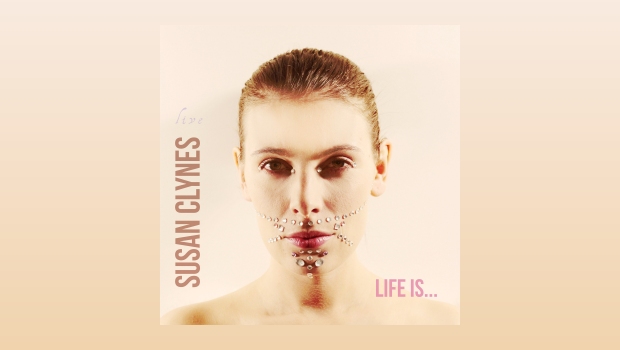After releasing her first album Sugar For A Dream back in 2005, Susan Clynes continued with her studies rather than pursuing the singer-songwriter dream, eventually obtaining a master’s degree in composition from Ghent Conservatory.
My first musical encounter with Susan came with her particularly sublime vocal on Glass Cubes, a track on one of the best progressive jazz fusion albums of last year, The Wrong Object’s After The Exhibition. That track showed the huge potential of combining her voice with a full band, but her album Life Is… is a different prospect altogether. The album combines recordings from three different live performances in Belgium, two from Brussels’ The Archiduc, and one from The Library of the Cultural Centre of Bree, a city in the north east near the Dutch border.
With all audience noise removed, Life Is… still retains the live feel, and we get Susan sat at her piano solo, or with upright bass and drums, or with cello. The minimalist backing that was necessitated by the live settings swings the spotlight towards the songs themselves, and onto Susan’s voice and ivory tinkling, and she is not found wanting in any of those departments. The occasional imperfections only serve to give this album the feel of a snapshot of the artist at one moment in time.
The music here can be described as a delightful combination of piano-based singer songwriter idioms, classical chamber music, and jazz-tinged pop music. There are five songs where Susan plays in tandem with cellist Simon Lenski, a member of Belgian chamber rock combo Daau. The first song to feature the cello is Childhood Dreams, a song of love and respect for an inspirational aunt, who lived her life for the moment, and who eventually left this world as a result of a hitherto unsuspected inherited illness. By turns wistful and striking, the song takes unexpected turns with stops and starts that reflect a mad fun-filled dash through a fulfilled life. The last section sees the song take in a reflective moment where the mournful cello is eventually joined by Susan’s wordless response with the uplifting top melody line, and the song passes away with a natural grace that is highly personal and emotive. Quite clever and more than effective, this song is a labour of love that took eight months to complete, and it was time well spent.
For me the highlight of the album is the following instrumental Les Larmes (The Tears), where the cello is used partly as melody, partly as another voice in addition to the yearning wordless vocals that occasionally appear. Almost a mini symphony, with themes woven into the fabric of a sometimes mysterious ride through what impresses as a Near Eastern atmosphere, the song winds through narrow dimly lit streets of the psyche with great effect, the cello rising to near screaming crescendo as the main melody strides insistently along.
The two songs featuring the double bass and drums are A Good Man and Ileana’s Song. While the latter is a love song to her daughter who was born during the making of this record, it would be good to think that the former, an atypically radio-friendly pop tune in the manner of Tori Amos, is aimed at her husband and mentor Antione Guenet, currently a member of Univers Zero, and a man with several strings to his musical bow.
The solo songs, like Tuesday Rain are easy to visualise being played in a downtown Brussels bar, late at night when thoughts turn romantic, with Susan in full jazz chanteuse mode.
Given the optimistic nature of the songs leading up to it, the very title When You’re Dead stands out before you’ve even heard a note of it. The cello and piano start a call and response, soon joined by the vocal “Where will you be when you’re dead, and those voices in your head” slowly spinning round and round, borne upwards on a musical updraft. The treated cello, with echo and looping makes this the most experimental of the songs and shows the ambition behind Susan’s compositions. On this one I get the feeling it is partly improvised, as the liner notes tell of a “telepathic” understanding between Susan and Simon. Whether or not improvisation is involved in this number, it works! The next song Pigeon’s Intrusion sees Simon’s cello shoot off into space riding a meteor while Susan’s piano keeps the song on a leash that prevents it from being flung out of orbit.
Susan has a fondness for a cyclical vocal, and it would be good to hear one of these being sung in the round with three or four voices. Closing song Butterflies is another of these, and it too has an experimental edge again courtesy of Simon’s cello. This last song dances in the sunlight; quite lovely it is, and it is a fitting way to end the album.
For a small country Belgium has a progressive music scene that puts larger territories to shame, and Susan Clynes is of that tradition, but she is also a writer of good songs that combined with her arranging skills make for an accessible yet forward thinking, and most of all, fun album.
TRACK LISTING
01. Life Is (4:21)
02. A Good Man (3:49)
03. Childhood Dreams (6:31)
04. Les Larmes (9:36)
05. Tuesday Rain (5:08)
06. Ileana’s Song (3:37)
07. When You’re Dead (7:15)
08. Pigeon’s Intrusion (6:00)
09. Le Voyage (3:22)
10. Linear Blindness (4:12)
11. Butterflies (6:38)
Total Time – 60:19
MUSICIANS
Susan Clynes – Piano & Vocals (all tracks)
Simon Lenski – Cello (tracks 3,4,7,8 & 11)
Pierre Mottet – Bass
Nico Chkifi – Drums (tracks 2 & 6)
ADDITIONAL INFO
Record Label: Moonjune Records
Catalogue#: MJR061
Released: 18 February 2014
LINKS
Main Website: Susan Clynes
Social Media: Facebook
Audio Samples: Bandcamp

